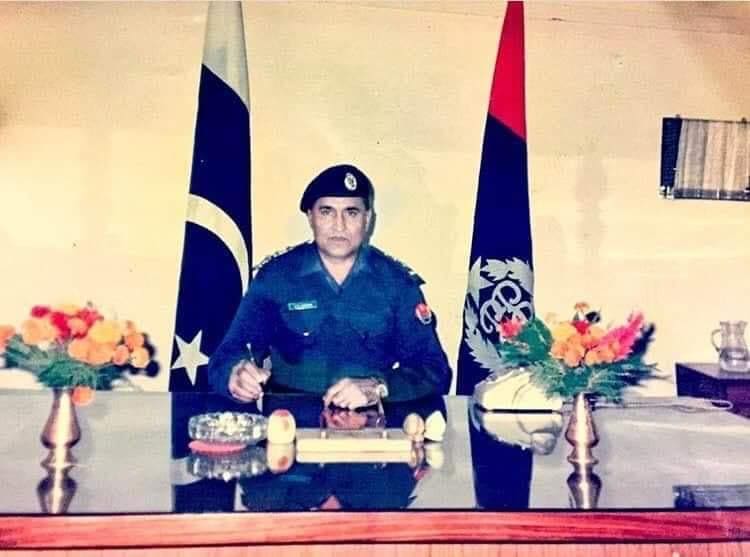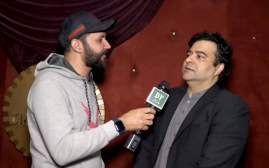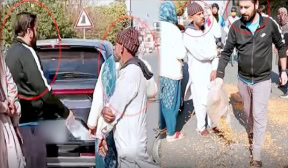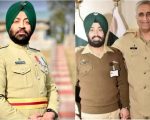NEW YORK – Raja Anar Khan (88), a retired Superintendent of Police, Special Branch of Pakistan Police, is an eyewitness to the deteriorating political history of Pakistan. He performed his duties in important places. While Sheikh Mujib-ur-Rahman was imprisoned in West Pakistan and was facing treason charges against him, Raja Anar Khan stayed with him for around nine months in his prison cells as “Mushakti” (Helper), although he was an intelligence officer from the Special Branch (CID).
Sheikh Mujib-ur-Rahman did not know until the last moment that Raja Anar Khan was an intelligence officer of the Special Branch. Raja Anar Khan accompanied Sheikh Mujib-ur-Rahman to the Mianwali and Lyallpur jails for several months. He remained in a jail cell as a security officer, hiding his identity, until he left for East Pakistan.
A few days after Dhaka’s fall, a conspiracy was hatched to assassinate Sheikh Mujib-ur-Rahman in the Mianwali prison. According to the plan, Sheikh Mujib-ur-Rahman and Rajay Khan (Anar Khan), the in-charge of his cell, was also to be killed. Some jail staff members were also involved in the conspiracy to kill Sheikh Mujib-ur-Rahman. An employee reported the conspiracy to the jail superintendent, who immediately reported the conspiracy to the Special Branch. Immediately, Sheikh Mujib-ur-Rahman and his bodyguard Raja Anar Khan and others were taken out of the jail cell by the Special Branch.
In prison with Sheikh Mujib-ur-Rahman as a security officer:
After serving as an intelligence and security officer in Mianwali, he accompanied Sheikh Mujib-ur-Rahman in Layalpur and Sahiwal jails as well. He says, “In April 1971, I was posted in the Special Branch, Shahi Qila Lahore. One day my boss, DSP Special Branch Khawaja Muhammad Tufail (father of late Jamaat-e-Islami leader Hafiz Suleman Butt), told me and SP Special Branch Sheikh Abdul Rehman, ‘Tomorrow we are going to Mianwali for an urgent matter. You also need to go with us’.
“The next day we reached the DSP Police Headquarters’ residence in Mianwali in a government jeep. There I was told that now I have to stay in Mianwali Jail as a security officer with Sheikh Mujib-ur-Rahman, a political prisoner brought from East Pakistan for a treason case.
“I was also told that apart from the responsibility of protecting Sheikh Mujib-ur-Rahman, I would have to give a diary of important matters related to him to my superiors on a daily basis. During this job, my departmental identity will be kept secret. And, in prison, I will serve as Sheikh Mujib-ur-Rahman’s Mushakti.
“As a labourer in prison with Sheikh Mujib-ur-Rahman, I was identified as “Rajay Khan” instead of my real name. A fake jail file was prepared under the same name as Rajay Khan. My crime on file was kidnapping a girl.”
Raja Anar Khan spent around nine months in Mianwali, Lyallpur and Sahiwal jails with Sheikh Mujib-ur-Rahman. He accompanied Sheikh Mujib during his trial in prison until his departure (April 1971 to January 1972) from Islamabad Airport to East Pakistan (Bangladesh). Playing an important role as an eyewitness, Raja Anar Khan witnessed the deteriorating political history of Pakistan and its many characters and tragedies with his own eyes.
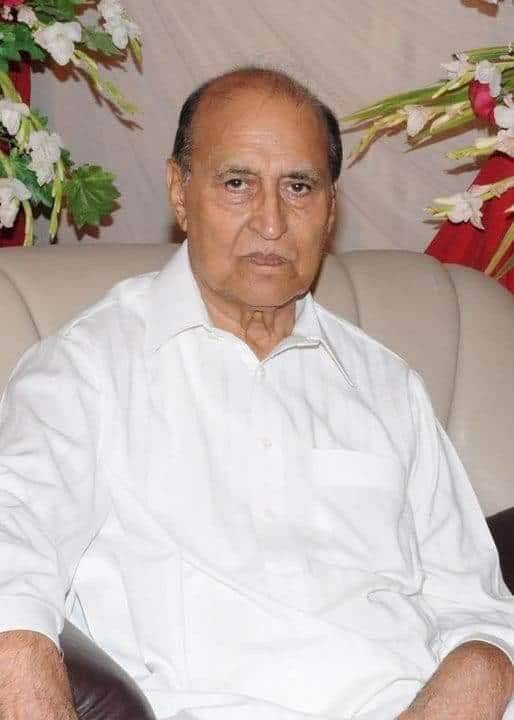
Raja Anar Khan, who has a sharp memory, did not shake his voice during his multiple WhatsApp and in-person interview sessions with me. However, while narrating the story of East Pakistan, especially that of the surrender after which East Pakistan became Bangladesh on December 16, 1971, there were tears in Raja Anar Khan’s eyes and his voice cracked many times with sadness and anger.
Sheikh Mujib-ur-Rahman: A patriot or a traitor?
Raja Anar Khan tells the story of the days he spent in a jail cell with Sheikh Mujib-ur-Rahman. “At first, Sheikh Mujib suspected a little that I was not what I should have been. He started asking me, ‘What crime have you been convicted of?’ I told the same official story that was in my prison file. The case was a girl’s kidnapping. He questioned again, ‘How many years have been the punishment.’ I replied, ‘Three years.’
Hearing my story, Sheikh Mujib-ur-Rahman laughed and said, “It’s strange that every hardworking prisoner sent to the cell with me is involved in kidnapping girls.” Raja Anar Khan said, “Before me, a Pathan prisoner used to work as a butler in these cells for Sheikh Mujib-ur-Rahman. He also told Sheikh Mujib the same story of a girl’s kidnapping.”
Raja Anar Khan talked about his nine months in Mianwali Jail with Sheikh Mujib-ur-Rahman 50 years ago. “His nature of duties included taking him out of the cell at the appointed time in the morning and then closing the cell back in the evening.”
“I would spend the entire day with him. Then, after locking him in the cell at night, it was my routine to hide the cell keys in different places every day instead of keeping them with me. Sometimes by digging in the ground and sometimes in other places, which was only in my knowledge. I used to do this every day for the safety and security of Sheikh Mujib-ur-Rahman,” says Raja Anar Khan.
Raja Anar Khan says, “Sleeping in a special room other than the closet at night, I never kept the key under my pillow or inside the room. As a security officer of Sheikh Mujib-ur-Rahman, all matters relating to him went to the Special Branch in the form of a daily diary, which I wrote. In addition, the Special Branch had installed a secret transmitter under the chair provided to Sheikh Mujib-ur-Rahman in the prison from which his conversations were recorded.”
“Those days when Sheikh Mujib-ur-Rahman was being tried for treason inside the jail, he sometimes refused to participate in the proceedings. If you were stubborn, you would fly away. Go and do whatever you want to do. I will not participate in the actions. Top officers of the Special Branch, especially SP Sheikh Abdul Rehman and DSP Khwaja Tufail, used to tell me, ‘Anar Khan do something. He, Sheikh Mujeeb-ur-Rehman, only listens to you. You can convince him to cooperate in the trial.’ When I would convince him, in the end, he would agree.”
Raja Anar Khan says, “Except for the initial days when I started my duty with Sheikh Mujib-ur-Rahman, I was a bit overwhelmed. I was also considered suspicious. Afterwards, his suspicions about me disappeared. And in a way, he started trusting me. I used to argue with him and then he would agree with me in the end. He participated in the trial against him on several occasions on my request. I used to address him as “Baba”.
“The government produced a Bengali Brigadier as a witness against Sheikh Mujib-ur-Rahman in a sedition case, who used to be in a very bad condition. So, he would be taken to jail in a uniform. Sheikh Mujib-ur-Rahman, more than testifying against him, expressed regret over his misery and plight and said, ‘He did not know where he was brought from. He doesn’t look like a Brigadier.’
“I was with Sheikh Mujibur Rahman during the treason trial. So, in a sense, I am a witness to the sedition case against him.
“What was happening those days on the political front in East Pakistan, Sheikh Mujibur Rahman was utterly unaware of that. Sometimes, when warplanes passed over the prison with their loud noise, Sheikh Mujib-ur-Rahman would ask me what was going on. ‘All right, isn’t it?’ I would talk to him and tell him that war games are happening.”
Raja Anar Khan says, “When war broke out in East Pakistan, on several occasions Indian warplanes passed over the Mianwali prison. An anti-aircraft was installed in the jail and a trench was also dug near his cell to protect Sheikh Mujib-ur-Rahman. Seeing the excavation on one occasion, he was terrified and said to me, ‘Rajay Khan, I think they have planned to hang me and bury me here.’
“In those days the digging of the trench continued even at night due to the threat of airstrikes and it was usually 3 or 4 O’clock the time of hanging in prisons. Seeing this, Sheikh Mujib was scared. However, I just said there is no such thing. Excavation is being done in connection with construction. I did not let him smell the rebellion that started in East Pakistan and the war that followed, or the threat of airstrikes. So he was completely unaware of the external situation.
“Later, Sheikh Mujib-ur-Rahman exaggerated the situation in his interview with BBC correspondent David Frost on his return to Dhaka via London from Pakistan, saying that his grave was prepared in Mianwali Jail.” According to Raja Anar Khan, “This is not true. It was just an 8 feet long and 5 feet deep trench built to protect him in case of an airstrike.”
“I had never heard the word ‘separation’ from Sheikh Mujib-ur-Rahman’s mouth.”
In response to the question, if Sheikh Mujib-ur-Rahman wanted to separate East Pakistan from West Pakistan or he talked about it during his jail days, Raja Anar Khan said, “He had never heard the word separation from Sheikh Mujeebur Rahman’s mouth.”
“Since he started trusting me and seeing my interest in history, he often spoke openly to me. He had a perfect hold of the Urdu language. He always used to talk to me in Urdu. He often said, “I have ruined my career for Pakistan. They have given their lives for Pakistan. When I was in college, sometimes only a couple of rupees were in my pocket, when the Tehreek-e-Pakistan was in full swing.”
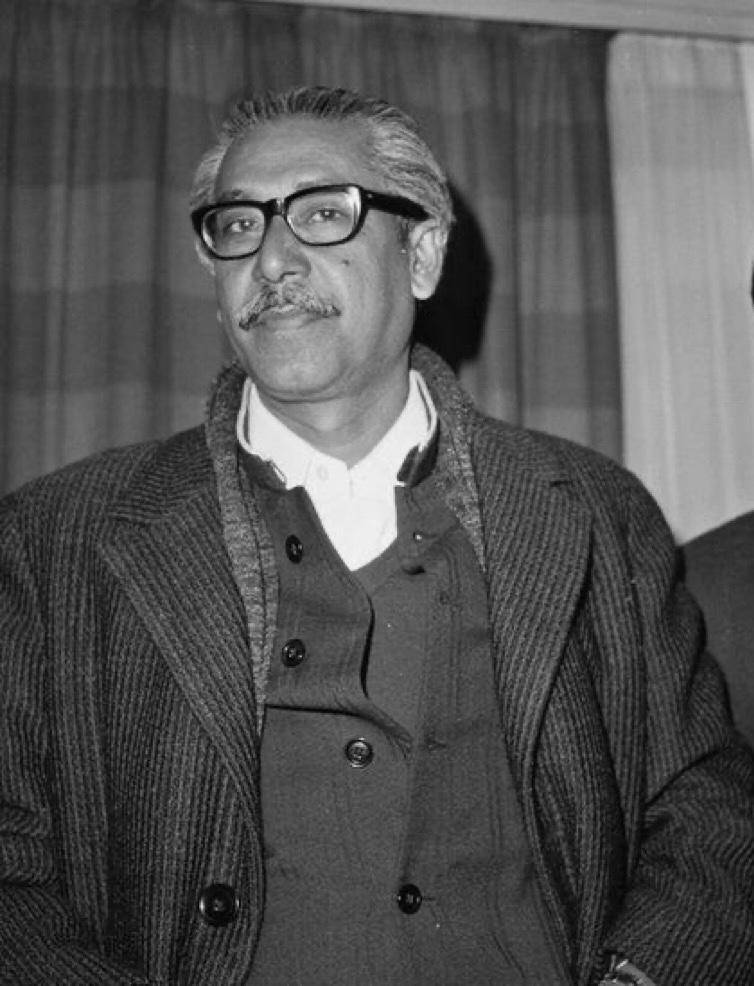
Sheikh Mujib-ur-Rahman’s stance on 6 points and his doubts about Tajuddin Ahmad
In response to a question about Sheikh Mujib-ur-Rahman’s famous six points, Raja Anar Khan said, “Sheikh Mujib-ur-Rahman had told him on several occasions that the six points were not his idea. Awami League presented it. Which he did not oppose. There was no citation in the six points leading to separation. Most of these points were about provincial autonomy.
Referring to Bengali leader Tajuddin, Sheikh Mujib said he had doubts about him but was also threatened by him, saying that he can bully him any time. Referring to Kashmir, Sheikh Mujib-ur-Rahman used to say, “We should keep the Kashmir issue alive without compromising our existence, but we should not destroy the rest of Pakistan for the sake of Kashmir.”
Sheikh Mujibur Rahman was a supporter of trade with India. He used to say that Pakistan should benefit from trade. East Pakistan should have more naval headquarters and airports for defence.
According to Raja Anar Khan, “Sheikh Mujibur Rahman was dissatisfied with the attitude of President Yahya Khan and Zulfikar Ali Bhutto. He thought they both wanted to punish him and get him out of their way.”
Raja Anar Khan said, “In December 1971, when the war in East Pakistan was in full swing, the threat arose that Indian warplanes might bomb the prison to kill Sheikh Mujib-ur-Rahman in Mianwali Jail. I was ordered by my superiors to immediately shift Sheikh Mujib from Mianwali prison to Lyallpur jail. The orders were that Sheikh Mujib should not be aware that he was in danger. He was told that his transfer was a routine matter.”
Raja Anar Khan says, “The vehicle in which Sheikh Mujib-ur-Rahman was being carried was camouflaged with mud. There were curtains on the windows. Sometimes Sheikh Mujib-ur-Rahman would remove them and look outside.
At one point, the vehicle slowed down and crossed by an army convoy. So, he started asking me, ‘What was going on? Where are so many military vehicles going?’ I told him they might be going for military exercises. Sheikh Mujib paused and said, ‘Is this the season of military exercise?’
After being kept in Lyallpur Jail for some time, on December 7, Sheikh Mujibur Rahman was transferred back to Mianwali Jail. During this period the trial of Sheikh Mujib-ur-Rahman continued inside the jails.
AK Brohi: Sheikh Mujib-ur-Rahman’s top defence lawyer:
Sheikh Mujib-ur-Rahman had sought Pakistan’s top defence lawyer Mr. A. K. Brohi, one of the most respected lawyers of West Pakistan by all factions. Eventually, Mr. A. K. Brohi was appointed to defend him. He came several times to the jail cell, met Sheikh Mujib and he started making preparations to defend him.
Raja Anar Khan says he was present in the room at some distance during the meetings between A. K. Brohi and Sheikh Mujib-ur-Rehman in jail. Sheikh Mujib-ur-Rahman was not allowed to meet his lawyer A. K. Brohi alone.
Several months later, the trial began in Lyallpur. Sheikh Mujib-ur-Rahman suddenly announced that he did not want to defend himself so Mr. Brohi should be sent home. Everyone was wondering what to do next. Special Branch SP Sheikh Abdul Rehman and DSP Khawaja Tufail asked Raja Anar Khan to try to persuade Sheikh Sahab to join the trial against him. Raja Anar Khan says on his persuasion, Sheikh Mujib agreed and began to participate in the proceedings in jail.
“Only Sheikh Mujib-ur-Rahman’s case was discussed. No political or outside information could be exchanged during the meetings with his lawyer A. K. Brohi. I was always there to make this sure,” says Raja Anar Khan.
December 16, 1971: Fall of Dacca (Dhaka):
On the day of surrender, I wept bitterly.
Raja Anar Khan recalled the surrender of the Pakistan Army to the Indian Army in East Pakistan. “As usual in the evening, I locked Sheikh Mujib-ur-Rahman in his cell and came to rest in my quarter adjacent to Sheikh Mujib’s cell. I turned the radio on to listen to BBC and heard the news of the surrender of the Pakistani Army to the Indian Army. It was December 16, 1971.
On hearing this, I started crying inconsolably. It felt like everything is over. There was anger, sadness, and depression and I could not sleep for a single moment that night. General Amir Abdullah Khan Niazi, a resident of Mianwali, was repeatedly mentioned in the news.
Conspiracy to kill Sheikh Mujib-ur-Rahman in jail:
Raja Anar Khan said, “In those days even children in Mianwali knew that Sheikh Mujib-ur-Rahman was imprisoned in Mianwali Jail. So, that evening, three days after the surrender in Dhaka, I locked Sheikh Mujib-ur-Rahman in his cell as usual and then dug a hole in the ground and hid the bunch of keys there. After eating my dinner, I went to my quarter and slept.
Suddenly, a loud knock on the door woke me up. I hurriedly got up and walked towards the door holding my government-issued revolver. There was a constant knock on my door.
I pulled the revolver towards the door and asked, who is there? A voice came, “Anar Khan! Anar Khan! Open the door, I am Khawaja Tufail! (DSP, Special Branch). I replied, “I will not open the door.” Then a voice came from outside, “Rajay Khan! Open the door please, this is a moment of an extreme emergency. The life of “Baba” (Sheikh Mujib-ur-Rahman) is in danger right now. Hurry up, hurry up. We have very little time to get him out of here.”
According to Raja Anar Khan, “It was a very critical and challenging moment of my service. I had a very sweet and honest relationship with my boss Khawaja Tufail who stood outside. Being a senior, he always treated me like a son. DSP Khawaja Tufail and SP Sheikh Abdul Rehman were Special Officers of a Rare Breed of Police Officers in the Special Branch, the Intelligence Department of Police. So I learnt a lot from them in my police service.
I asked for a few more pointers to confirm with him and finally opened the door. He spoke before I could ask anything. Anar Khan! We must get Sheikh Mujib-ur-Rahman out of his cell and take him to a safe place. He mentioned that at some point tonight the jail inmates plan to kill Sheikh Mujib along with you and everyone who is taking care of him in his cell.
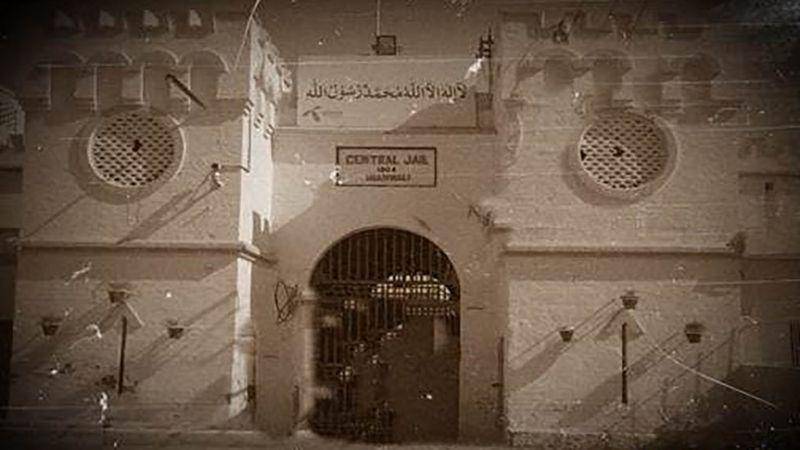
Several junior prison staff members have joined the plan. Ladders have been provided to reach Sheikh Mujib’s cell from the roof. An insider immediately informed about this conspiracy to the jail superintendent. The matter has come to our notice directly. Hurry up, get the keys.
Raja Anar Khan recalls, “I ran outside and found the keys hidden underground. As I opened the inner door of Sheikh Mujib’s cell, I could feel fear in his eyes and face.
December 18, 1971: When we saved Sheikh Mujib-ur-Rahman in jail:
I opened the door and said to Sheikh Mujib, “Baba! Baba! Get out quickly.” Sheikh Mujib asked, “Are you hanging me?” This was usually the time when prisoners waiting to be hanged inside the prison are hanged. Of course, that kind of thought could hit the mind of Sheikh Mujib.
Raja Anar Khan said, “I hurriedly said, ‘No, Baba, no. There is no such thing. Your life is in danger here. We are taking you to a safe place.”
He listened to me and agreed to come with us. And within minutes we brought him out of jail safely in a jeep brought by Khawaja Tufail. However, the jeep driver was a bit goofy. Instead of turning the jeep carrying Sheikh Mujib-ur-Rahman and attaching it behind the closet door, he kept the jeep upright.
When we were sitting in the jeep with Sheikh Mujib-ur-Rahman, the driver reversed the jeep at full speed. When he took a U-turn in the dark of night with the squeaking of the jeep tyres, many inmates came towards us after hearing the noise. Perhaps they had heard that Sheikh Mujib-ur-Rahman had been picked up safely.
According to Raja Anar Khan, many prisoners involved in the conspiracy to kill Sheikh Mujib in Mianwali Jail belonged to Mianwali. They were angered by the treatment and humiliation meted out to Mianwali’s son, General A. A. K. Niazi after he surrendered to the Indian Army.
In response, they hatched a plot to assassinate Sheikh Mujib in Mianwali Jail. Later, several prison staff members joined in and provided stairs and equipment to reach Sheikh Mujib’s cell.
However, timely information about the conspiracy reached the jail superintendent through an insider, who immediately informed the Special Branch about the plot. Due to this timely action, Sheikh Mujib was saved from falling prey to a conspiracy.
Sheikh Mujib-ur-Rahman was trembling:
Raja Anar Khan narrated the story of Sheikh Mujib-ur-Rahman after he was safely brought out of the Mianwali jail that night and taken to the place where SP Special Branch Sheikh Abdul Rehman had already reached.
It was a cold winter day. On leaving the prison, we immediately took Sheikh Mujib-ur-Rahman with us. The two rooms behind the DSP Headquarters’ residence in Mianwali were in the official use of the Special Branch. Sheikh Mujib-ur-Rahman was kept in one of these rooms. Unfortunately, the electric heater installed in the room was unable to reduce the room’s temperature due to severe cold.
Sheikh Mujib sat on a chair in the room, but it was very cold, and perhaps there was an element of fear as well. That’s why he was trembling. Seeing his condition, I immediately put my warm shawl on him. And I sat all night in the cold.
Raja Anar Khan says more than 50 years have passed, but even today I can recall that night’s cold.
Sheikh Mujib-ur-Rahman arrives at Chashma Barrage:
Raja Anar Khan narrates that after spending a night at the DSP Headquarters’ residence, the next day we received an order that Sheikh Mujib should be shifted to a residential colony at Chashma Barrage.
After coming here, the fear in Sheikh Mujib’s mind had disappeared to a great extent. He was very happy with our good behaviour and timely action. However, my duty was still accompanying Sheikh Mujib as his security officer.
Sheikh Mujib-ur-Rahman spent most of 1971 in prison. After the Pakistan Army surrendered in East Pakistan and India held thousands of Pakistani soldiers as prisoners of war, Yahya Khan resigned and handed over power to Zulfikar Ali Bhutto. Sheikh Mujib was still completely unaware of this?
We stayed with Sheikh Mujib in a bungalow in the residential colony of Chashma Barrage near Mianwali for about a week. After that, I lived with Sheikh Mujib in one of the bungalows, while the rest of the officers of the Special Branch lived in the other two bungalows.
Sheikh Mujib-ur-Rahman: Chashma to Sihala:
“After keeping Sheikh Mujib-ur-Rahman in Chashma town for a week, the next order was to take him to Sihala Rest House. For this, arrangements were made. A helipad was made in Kundyan town to land the helicopter. Everything was happening very fast. I was told by my boss that I would go on the plane with Sheikh Mujib. Others accompanying Sheikh Mujib-ur-Rahman in the helicopter were SP Sheikh Abdul Rehman and DSP Khawaja Tufail of the Special Branch.
The helicopter was ready to fly. They were waiting for me in the helicopter. I was collecting belongings of myself and Baba Sheikh Mujib because it was my duty to pack my luggage as well as that of Sheikh Mujib’s. In that, I was a little late and Sheikh Abdul Rahman, my SP, became very angry at me. He let me board the helicopter with them. However, he allowed Sheikh Mujib-ur-Rahman’s stuff on the helicopter, but threw my belongings from the plane in a state of anger because he blamed me for the delay. However, my belongings reached me in the evening by vehicles of the Special Branch.
January 7, 1972: Zulfikar Ali Bhutto’s meeting with Sheikh Mujib-ur-Rahman:
Raja Anar Khan recalls, “Sheikh Mujib-ur-Rahman came to know about my true nature. Before that, he thought I was just a prisoner. In the historic face-to-face meeting between Zulfikar Ali Bhutto and Sheikh Mujib-ur-Rehman at Sihala Rest House, I was the third lone man to hide behind the curtain. I was ready to tackle any situation with my revolver in my hand.
The meeting was one-on-one and I was the third person listening to them talking behind the scenes. Both leaders’ discussion was recorded by a transmitter installed under their chairs. The historic meeting started with tense faces and hugs from both sides but ended happily. The rest of the details of the conference are in the history books.
Raja Anar Khan goes 50 years back and says, “It was a delightful moment when Sheikh Mujib-ur-Rahman said, ‘Anar Khan, come with me. You will be my SP Dhaka.” But I politely refused, saying thank you very much, Baba! I do my job, my assignment with my heart and now it’s over.
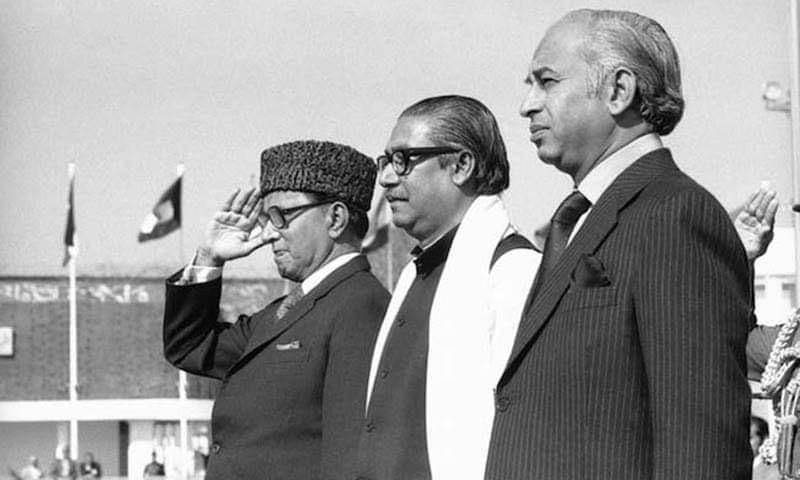
Goodbye Baba!
In January 1972, when Zulfikar Ali Bhutto decided to release Sheikh Mujib-ur-Rahman and send him back, through my SP Sheikh Abdul Rehman, the truth about my identity came out. Sheikh Mujib-ur-Rahman came to know that I was not a prisoner or a Mushakti in Mianwali, Lyallpur and Sahiwal Jails with him. Rather, I was a special branch inspector. In the farewell meeting, Sheikh Mujib-ur-Rahman held both my hands and kissed them. He said, “It’s a pity that I was taking work from these hands.”
On this occasion, Sheikh Mujib-ur-Rahman affectionately addressed me as a “Naughty Boy” and insisted, “Anar Khan! Come to Dhaka with me, I will appoint you my SP Dhaka.” I thanked Baba and refused politely.
Raja Anar Khan, sharing memories of his last meeting with Sheikh Mujib-ur-Rahman, says, “Sheikh Mujib-ur-Rahman gifted him his cigar pipe and famous Russian author Fyodor Dostoyevsky’s book “Crime and Punishment” in Mianwali Jail. He wrote these lines in the book with his pen, “In the long run lies and truth triumph, untruth prevails, but in the end, truth prevails.”
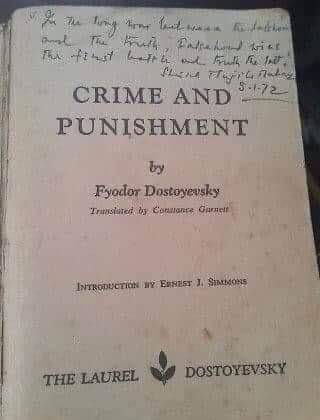
Signed by (Sheikh Mujib-ur-Rahman: 05/01/ 1972). I still have these gifts with me as his sweet memories.
“Sheikh Mujib-ur-Rahman used to insist on taking me with him to Dhaka in the presence of my superiors before leaving Pakistan. When I didn’t respond, he finally said, “Come to the airport with me.” I respectfully said, “I was with you till now. The task that was given to me is over now. Allah Hafiz, Baba.”
According to Raja Anar Khan, “When the Islamic Summit was held in 1974, Prime Minister Sheikh Mujib-ur-Rahman came from Bangladesh to attend it in Lahore. On this occasion, he met my senior. SSP Special Branch Sheikh Abdul Rehman, in the Police Department. Sheikh Mujib-ur-Rahman again asked me through my boss to meet him and come to Bangladesh with him, but I refused.”
“It is true that Sheikh Mujib-ur-Rahman was emotionally attached to me as I was on official duty with him for a long time. But my job and professionalism required me to distance myself from him instead of getting into trouble.
Step One: Moving forward, you can also come to the notice of your intelligence agencies. Which made the video an overnight sensation? I had a departmental assignment with them. Which is over.”
After duty as Inspector CIA Jhang and assignment with Sheikh Mujib-ur-Rahman, Raja Anar Khan served as Inspector CIA Phalia and Malikwal. These regions were on the top in terms of crime. The Department specially deployed him in such areas. Later, he was posted as DSP Special Branch Faisalabad and Sargodha. From 1996 to 1997, he worked as ADIG and later continued to perform his duties as Principal at Bahawalpur and Faisalabad RTC Centres. Later, Raja Anar Khan was promoted to Superintendent of Police (SP).
Raja Anar Khan, who joined the police service in 1960, retired early in 1999 due to a heart ailment after an illustrious policing career of 39 years. While in the police department, he witnessed the deteriorating political history of Pakistan. But, in the end, he says he’s quite satisfied with his official work, life and role. He thanked the Almighty who gave him the courage to fulfil his duties as a dedicated son of the soil.
Raja Anar Khan, who has been a part of several historical events, is now living in Rawalpindi. He has not wanted any awards or medals of appreciation and is leading a contented and peaceful life with his children and grandchildren.

